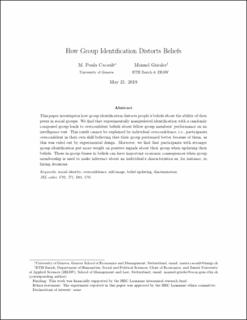Please use this identifier to cite or link to this item:
https://doi.org/10.21256/zhaw-18036Full metadata record
| DC Field | Value | Language |
|---|---|---|
| dc.contributor.author | Cacault, Maria Paula | - |
| dc.contributor.author | Grieder, Manuel | - |
| dc.date.accessioned | 2019-08-29T13:52:59Z | - |
| dc.date.available | 2019-08-29T13:52:59Z | - |
| dc.date.issued | 2019 | - |
| dc.identifier.issn | 0167-2681 | de_CH |
| dc.identifier.issn | 1879-1751 | de_CH |
| dc.identifier.uri | https://digitalcollection.zhaw.ch/handle/11475/18036 | - |
| dc.description.abstract | This paper investigates how group identification distorts people’s beliefs about the ability of their peers in social groups. We find that experimentally manipulated identification with a randomly composed group leads to overconfident beliefs about fellow group members’ performance on an intelligence test. This result cannot be explained by individual overconfidence, i.e., participants overconfident in their own skill believing that their group performed better because of them, as this was ruled out by experimental design. Moreover, we find that participants with stronger group identification put more weight on positive signals about their group when updating their beliefs. These in-group biases in beliefs can have important economic consequences when group membership is used to make inference about an individual’s characteristics as, for instance, in hiring decisions. | de_CH |
| dc.language.iso | en | de_CH |
| dc.publisher | Elsevier | de_CH |
| dc.relation.ispartof | Journal of Economic Behavior & Organization | de_CH |
| dc.rights | https://creativecommons.org/licenses/by-nc-nd/4.0/ | de_CH |
| dc.subject | Belief updating | de_CH |
| dc.subject | Discrimination | de_CH |
| dc.subject | Overconfidence | de_CH |
| dc.subject | Social identity | de_CH |
| dc.subject.ddc | 305: Personengruppen (Alter, Herkunft, Geschlecht, Einkommen) | de_CH |
| dc.title | How group identification distorts beliefs | de_CH |
| dc.type | Beitrag in wissenschaftlicher Zeitschrift | de_CH |
| dcterms.type | Text | de_CH |
| zhaw.departement | School of Management and Law | de_CH |
| zhaw.organisationalunit | Zentrum für Energie und Umwelt (CEE) | de_CH |
| dc.identifier.doi | 10.1016/j.jebo.2019.05.027 | de_CH |
| dc.identifier.doi | 10.21256/zhaw-18036 | - |
| zhaw.funding.eu | No | de_CH |
| zhaw.originated.zhaw | No | de_CH |
| zhaw.pages.end | 76 | de_CH |
| zhaw.pages.start | 63 | de_CH |
| zhaw.publication.status | acceptedVersion | de_CH |
| zhaw.volume | 164 | de_CH |
| zhaw.embargo.end | 2022-09-01 | de_CH |
| zhaw.publication.review | Peer review (Publikation) | de_CH |
| zhaw.webfeed | W: Spitzenpublikation | de_CH |
| zhaw.author.additional | No | de_CH |
| Appears in collections: | Publikationen School of Management and Law | |
Files in This Item:
| File | Description | Size | Format | |
|---|---|---|---|---|
| 2019_Cacault-Grieder_Group-Identification.pdf | Accepted Version | 714.01 kB | Adobe PDF |  View/Open |
Show simple item record
Cacault, M. P., & Grieder, M. (2019). How group identification distorts beliefs. Journal of Economic Behavior & Organization, 164, 63–76. https://doi.org/10.1016/j.jebo.2019.05.027
Cacault, M.P. and Grieder, M. (2019) ‘How group identification distorts beliefs’, Journal of Economic Behavior & Organization, 164, pp. 63–76. Available at: https://doi.org/10.1016/j.jebo.2019.05.027.
M. P. Cacault and M. Grieder, “How group identification distorts beliefs,” Journal of Economic Behavior & Organization, vol. 164, pp. 63–76, 2019, doi: 10.1016/j.jebo.2019.05.027.
CACAULT, Maria Paula und Manuel GRIEDER, 2019. How group identification distorts beliefs. Journal of Economic Behavior & Organization. 2019. Bd. 164, S. 63–76. DOI 10.1016/j.jebo.2019.05.027
Cacault, Maria Paula, and Manuel Grieder. 2019. “How Group Identification Distorts Beliefs.” Journal of Economic Behavior & Organization 164: 63–76. https://doi.org/10.1016/j.jebo.2019.05.027.
Cacault, Maria Paula, and Manuel Grieder. “How Group Identification Distorts Beliefs.” Journal of Economic Behavior & Organization, vol. 164, 2019, pp. 63–76, https://doi.org/10.1016/j.jebo.2019.05.027.
Items in DSpace are protected by copyright, with all rights reserved, unless otherwise indicated.